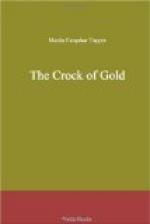When the bailiff takes his round about the property, as we see him now, he is mounted—to say he rides would convey far too equestrian a notion—he is mounted on a rough-coated, quiet, old, white shooting-pony; the saddle strangely girded on with many bands about the belly, the stirrups astonishingly short, and straps never called upon to diminish that long whity-brown interval between shoe and trowser: Mr. Jennings sits his steed with nose aloft, and a high perch in the general, somewhat loosely, and, had the pony been a Bucephalus rather than a Rozinante, not a little perilously. Simon is jogging hitherwards toward Roger Acton, as he digs the land-drain across this marshy meadow: let us see how it fares now with our poor hero.
Occupation—yes, duteous occupation—has exerted its wholsesome influences, and, thank God! Roger is himself again. He has been very sorry half the day, both for the wicked feelings of the morning, and that still more wicked theft—a bad business altogether, he cannot bear to think of it; the gold was none of his, whosesoever it might be—he ought not to have touched it—vexed he did, but cannot help it now; it is well he lost it too, for ill-got money never came to any good: though, to be sure, if he could only get it honestly, money would make a man of him.
I am not sure of that, Roger, it may be so sometimes; but, in my judgment, money has unmade more men than made them.
“How now, Acton, is not this drain dug yet! You have been about it much too long, sir; I shall fine you for this.”
“Please you, Muster Jennings, I’ve stuck to it pretty tightly too, barring that I make to-day three-quarters, being late: but it’s heavy clay, you see, Mr. Simon—wet above and iron-hard below: it shall all be ready by to-morrow, Mr. Simon.”
Whether the “Mr. Simon” had its softening influence, or any other considerations lent their soothing aid, we shall see presently; for the bailiff added, in a tone unusually indulgent,
“Well, Roger, see it is done, and well done; and now I have just another word to say to you: his honour is coming round this way, and if he asks you any questions, remember to be sure and tell him this—you have got a comfortable cottage, very comfortable, just repaired, you want for nothing, and are earning twelve shillings a week.”
“God help me, Muster Jennings: why my wages are but eight, and my hovel scarcely better than a pig-pound.”
“Look you, Acton; tell Sir John what you have told me, and you are a ruined man. Make it twelve to his honour, as others shall do: who knows,” he added, half-coaxing, half-soliloquizing, “perhaps his honour may really make it twelve, instead of eight.”
“Oh, Muster Jennings! and who gets the odd four?”
“What, man! do you dare to ask me that? Remember, sir, at your peril, that you, and all the rest, have had twelve shillings a-week wages whenever you have worked on this estate—not a word!—and that, if you dare speak or even think to the contrary, you never earn a penny here again. But here comes John Vincent, my master, as I, Simon Jennings, am yours: be careful what you say to him.”




